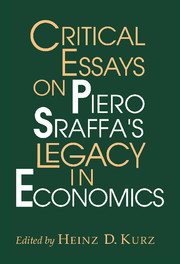Book contents
- Frontmatter
- Contents
- Preface
- List of contributors
- Part I Introduction
- 1 Piero Sraffa's contributions to economics: a brief survey
- 2 Revisionist findings on Sraffa
- Part II Returns to scale, demand, money and interest, and the classical tradition
- Part III Long-period theory and the problem of capital
- Part IV Intertemporal equilibrium theory and the problem of capital
- Mathematical Note by Michele Tucci
- Author index
- Subject index
1 - Piero Sraffa's contributions to economics: a brief survey
Published online by Cambridge University Press: 05 June 2012
- Frontmatter
- Contents
- Preface
- List of contributors
- Part I Introduction
- 1 Piero Sraffa's contributions to economics: a brief survey
- 2 Revisionist findings on Sraffa
- Part II Returns to scale, demand, money and interest, and the classical tradition
- Part III Long-period theory and the problem of capital
- Part IV Intertemporal equilibrium theory and the problem of capital
- Mathematical Note by Michele Tucci
- Author index
- Subject index
Summary
In this note a brief summary of Sraffa's contributions to economics will be given. This summary serves two purposes. It introduces the following discussion and it informs the reader about some contributions to economics by Sraffa not dealt with at all, or dealt with only in passing, in the essays contained in this book. In addition, some of the important developments triggered by his contributions will be mentioned. The overall purpose of this note is to round up the picture of Piero Sraffa's legacy in economics. It is not claimed that the account given is complete with regard to Sraffa's own works or the body of literature inspired by them. Summaries imply selection and interpretation, and consequently reflect the predilection and views of the authors. Other people may see things differently from the way we see them. However, we have made an effort to present things as impartially as is possible to us.
Early works
Piero Sraffa was born in Turin, Italy, on 5 August 1898. After graduation from the local university he went to the London School of Economics (1921-22). In England he was introduced to John Maynard Keynes who invited him to contribute an article on the Italian banking system for the Manchester Guardian, and a paper entitled ‘The Bank Crisis in Italy’ for the Economic Journal (Sraffa, 1922). This article, which contained an attack on the Fascists, provoked fierce reactions from the Mussolini government. Nevertheless, in November 1923 Sraffa was appointed to a lectureship in Political Economy and Public Finance at the University of Perugia.
- Type
- Chapter
- Information
- Publisher: Cambridge University PressPrint publication year: 2000
- 5
- Cited by



